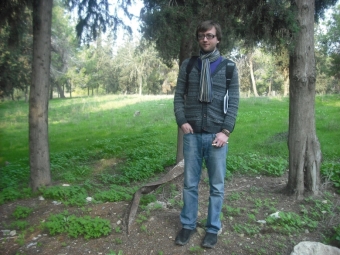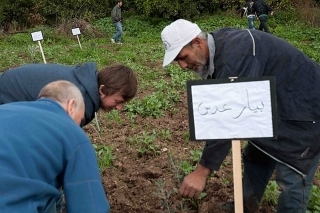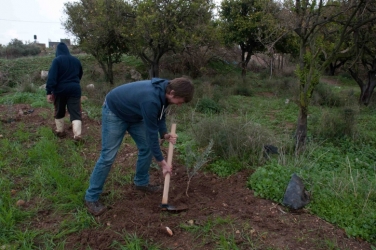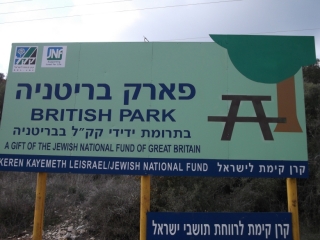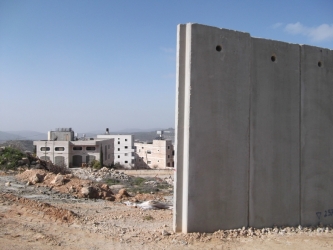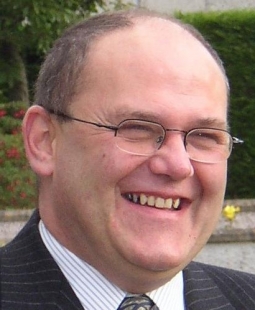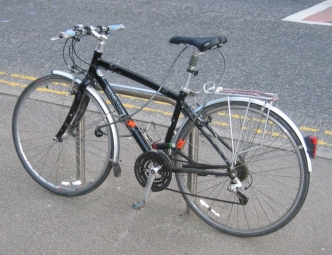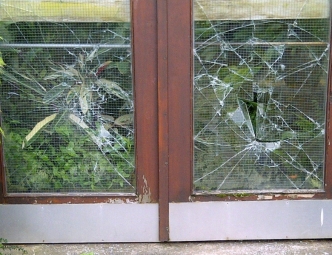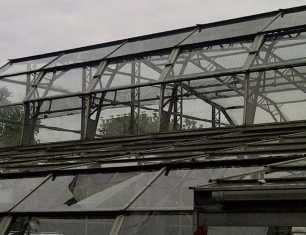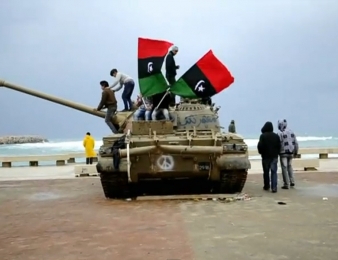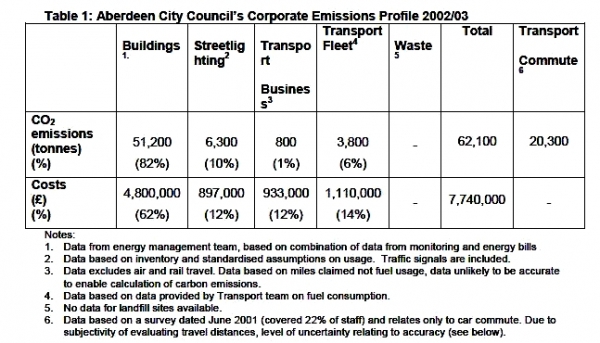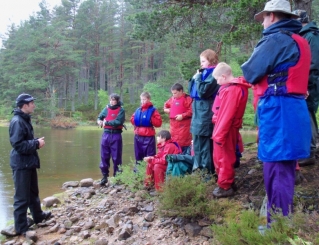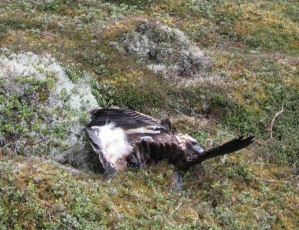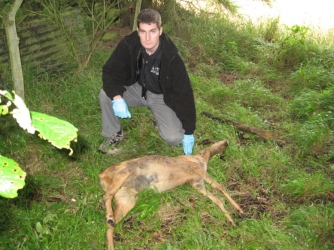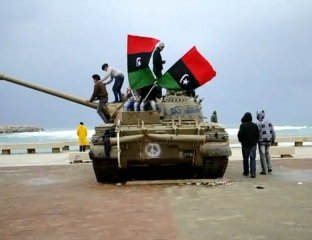On January 2nd an Aberdeen-based member of Scottish Palestine Solidarity Campaign (SPSC) took part in a new project to re-plant trees in previously devastated areas of Palestine. Dave Black, along with other members of the Stop the JNF international delegation, joined individuals from a nearby refugee camp, trade union representatives, youth activists, Stop the Wall campaigners and representatives of political parties. The group planted 111 trees, representing the number of years that the Jewish National Fund (JNF) has been in existence, playing a key role in Israel’s policy of displacing and dispossessing Palestinians.
The JNF controls land that the organisation openly decrees is solely for the benefit of Jewish people; non-Jewish people are not able to live or work on the land and it can only be sold or rented to Jewish people.
The organisation is a quasi-governmental one, with extremely close ties to the state; it is often referred to as a para-statal organisation.
Despite the JNF’s clearly discriminatory policies, the Israeli state maintains this strong relationship with the organisation.
The trees were planted in Tulkarem district, formerly one of the richest and most important districts of Palestine. In 1948, most of its lands were taken and dozens of villages destroyed. The JNF played a key role in the destruction of some of these villages and the ethnic cleansing of their population.
The land where the trees have been planted, in the city of Tulkarem, was historically part of the agricultural land of the city. However, in 2002 the Israeli military bulldozed the entire stretch of land, supposedly for “security reasons”. Tulkarem has also been one of the districts most affected byIsrael’s illegal separation wall, which has destroyed some 8.4 square kilometres of olive and other fruit trees, 37.3 km of water networks, 15 km of agricultural roads, as well as irrigated agricultural land in Tulkarem, Qalqiliya and Jenin districts.
Despite poor weather on the day there was a large turnout and the event was welcomed by those involved. A representative from the Palestinian Farmer’s Union explained the importance of such events that bring different groups together:
“the participation of farmers, youth groups, friends from various organisations and others increases belief in the justice of our cause and the belief that we are not working alone against the Occupation. The land that was so important land to us was uprooted by the Occupation”.
He also added that the event was timely because of the ongoing attacks by settlers on Palestinian land.
Aberdeen’s ties to the project were already significant as the local branch of SPSC last year raised £650 for the Plant-a-Tree in Palestine project.
Over 5 days the group walked 84 miles along the path of Hadrian’s Wall, raising awareness of the Stop the JNF campaign and also of the separation wall.
The group’s efforts went towards funding the planting event in Tulkarem. It is hoped that the Plant-a-Tree in Palestine project will build to support the ongoing struggle of Palestinians to rebuild by providing resources for villages to plant trees that are indigenous to Palestine’s natural environment and agricultural life.
The delegation included members of Palestine solidarity and campaign groups in Scotland, England, the United States, France, Austria, as well as a representative of Midlothian Trade Unions Council. The main activity of the delegation was 5 days of fact-finding and educational visits around Israel and the West Bank, followed by the day of tree planting in Tulkarem.
The group visited Al-Araqib in the Naqab/Negev desert, a Bedouin village which has been destroyed 33 times since July 22nd 2010. The trees of the village have been destroyed and thus the village’s livelihood and the JNF has been instrumental in displacing the Bedouin people of this area.
Within clear view of the village that remains is the Ambassadors Forest, one of the JNF’s many forests in Israel. As the delegation spoke with villagers, including the sheikh of the village, a truck drove by on the sandy, desert road. The truck was on its way to provide water for the new JNF trees; the wrong trees planted at the wrong time, thus requiring much additional water. The village of Al Araqib has no water supplied to it, but instead villages have to watch trucks drive past on their way to irrigate trees that are steadily taking over their land.
The group also spoke to a staff member of the UK ambassador’s officer in Israel, who was visiting the village in preparation for the visit of the British ambassador and Parliament Under Secretary of State Alistair Burt.
The chance meeting allowed the British members of the delegation to raise the issue of the UK’s complicity with the JNF and Israeli crimes, and specifically Early Day Motion (1677) which was tabled last year and currently has over 50 signatories.
The Early Day Motion outlines the discriminatory nature of the JNF and calls for the revocation of the JNF’s charity status in the UK. The motion also criticises the Prime Minister’s patronage of the JNF, a situation which was addressed for the first time since the foundation of the JNF when David Cameron stepped down as patron last year.
For the first time since its creation not one of the three main party leaders in the UK are patrons of the organisation.
Later in the week delegates visited refugees in Ramallah (in the West Bank) who had originally lived in the Palestinian village of Imwas. The refugees told the group the fate of their village in 1967 when it was overrun by Israeli forces set on taking the Latrun Salient, a hillside seen as a key strategic target.
Photos were shown, taken from exactly the same position, that illustrated the dramatic changes to the village and land in the 1960s and 70s. The first photo showed part of the thriving village, the final one showing what is now known as Canada Park.
Canada Park is one of the many parks and forests that JNF has been responsible for establishing in Israel, or in this case Israel and the West Bank. Sections of the park, such as where the village of Imwas once stood, are within the Palestinian side of the “Green line”, or armistice line drawn up at the end of the 1967 war. However, there is no sign of this and almost all visitors to the park remain oblivious, nor is it explained that the walls of the park entrance are built with the bricks of the houses of Imwas.
Delegates visited the park along with Said, a direct descendant of a family which was displaced from Imwas. Said stood with his own children at the remains of his father’s house, now only the barest of remnants. The group was also shown the other remaining evidence of the village: unmarked, unprotected memories scattered around the archaeological set-piece of Roman Baths for tourists to enjoy. The gravestones of villagers stand just a few feet from one of the park’s picnic benches – a stark, chilling image.
Another JNF park, British park, was also visited. This was of special interest to the UK participants on the delegation.
The park is built over 2 Palestinian villages: Ajjur and Zakariyya. The villages were 2 of the roughly 500 villages where massacres and forced population transfer of Palestinians from their lands in 1948.
This period is known by Palestinians as the Nakba – Arabic for “catastrophe”.
The JNF played a key part in planning the Nakba and then went on to expropriate the land of Palestinian refugees and proceeded to build parks, such as British Park, on the land using funds raised by the JNF around the world.
In 1948 the village of Ajjur was populated by 3000 people. Three of the original houses of Ajjur remain today, including what was previously a clinic and is now a winery serving the new Israeli towns that now intersperse British Park. Where the market of Ajjur once stood is now inhabited by a play-park and some, presumably, “British” sheep; a favourite picnic spot for those visiting British Park.
On the fifth day of the delegation the group visited Al-Walaja, a town that was established in the West Bank after the original village of Walaja was destroyed; the JNF went on to build the Kennedy memorial on the land. After years of living in caves near the original town, the new town was established and former residents could return to some form of normality. Normality, that is, until the development of Israel’s illegal Separation Wall, which is set to once again devastate the village.
The wall is still under construction and already surrounds much of the town, but when complete will completely surround the town. Residents will be forced to use an access road controlled by the Israeli military if they wish to leave. This wall will cut residents off from much of their agricultural land, and will inevitably lead to displacement away from the town as residents look to find viable employment.
The locations visited by the delegation left those involved in no doubt of the JNF’s deep complicity in crimes against Palestinians, past and present.
Witnessing the situation that faces so many Palestinians inevitably shocked, saddened and deeply moved those involved.
However, none of the delegates failed to be inspired and in awe of the resistance of the Palestinian people who fail to lie down and accept the injustice that has been forced upon them.
Many different forms of resistance were seen, some large and obvious and some more subtle but no less impressive. The commitment to resistance of those that were encounters served to emphasise the important of the ongoing efforts around the world to show solidarity with Palestinians, such as the Boycott, Sanctions and Divestment campaign against Israel.
The Plant-a-Tree in Palestine project is one such way in which people can resist the injustices enforced by the JNF and the Israeli government.
The project will never be able to compete with the financial clout of the JNF and the 240 million trees that this has allowed the organisation to plant in Israel and the West Bank. However, the project does allow a positive way to act against such crimes, enabling Palestinians to resist ongoing attempts at dispossession.
As Stop the Wall Co-ordinator Jamal Juma pointed out, it is also serves as an ideal way to educate those affected, Palestinians young and old, about the role of the JNF in the dispossession of their homes. The project also offers great potential for future collaboration between Palestinians and the international community to take part in non-violent resistance against the Israeli government’s attempts to entrench the illegal occupation of the West Bank, dispossess Palestinians within Israel of even more of their lands, and take away the rights, enshrined in international law, of 7 million refugees to return to their homes in Israel.
For more on the Stop the JNF campaign: www.stopthejnf.org
Join the Palestine campaign in Aberdeen: Aberdeen@scottishpsc.org.uk
Visit: www.Facebook.com/Spscaberdeen
